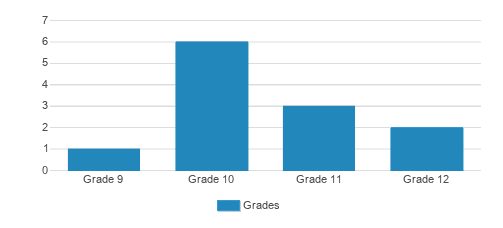EATC works with adolescent girls ages 12 to 17 in a residenital settting providing a private school curriculum and Christian discipleship training for teens struggling with life controlling issues.
We provide life skills, biblical training, continued eductation and most importantly hope for families in crisis.
Quick Stats (2025)
- School Type: Alternative School
- Grades: 9-12
- Enrollment: 12 students
- Average class size: 12 students
- Application Deadline: None / Rolling
- Source: Verified school update
School Overview
School Type
School Membership(s)School Assoc.
Religious Affiliation
Grades Offered
Grades 9-12
ADD/ADHD Support
Yes
Learning Difference Programs
Yes
Year Founded
14
Summer School Offered
Yes
Summer Program Details
Student Body
Total Students
12 students
Student Body Type
% Students of Color
25%
State avg.: 30%
Students by Grade

Academics and Faculty
Total Classroom Teachers
4 teachers
Student : Teacher Ratio
3:1
National avg.: 13:1
% Faculty w/Advanced Degree
4%
Average Class Size
12 students
Classroom Dress Code
Casual
Tuition and Acceptance Rate
Admission Deadline
None / Rolling
Admissions Director
Lisa Cox
School Notes
- EATC works with adolescent girls ages 12 to 17 who are struggling with life controlling issues. There is an application and enrollment process so reach out today for more informaion.
Source: Verified school update
Frequently Asked Questions
Does Eastern Appalachian Teen Challenge offer a summer program?
Yes, Eastern Appalachian Teen Challenge offers a summer program. Visit their summer school page for more information.
When is the application deadline for Eastern Appalachian Teen Challenge?
The application deadline for Eastern Appalachian Teen Challenge is rolling (applications are reviewed as they are received year-round).
School Reviews
Endorse Eastern Appalachian Teen Challenge. Endorsements should be a few sentences in length. Please include any comments on:
- Quality of academic programs, teachers, and facilities
- Availability of music, art, sports and other extracurricular activities
- Academic or athletic awards
Recent Articles

A Parent's Guide To Understanding High School Teaching Methods
This comprehensive guide helps parents navigate the various teaching methods used in today's high school classrooms. By understanding these approaches, you'll be better equipped to support your teen's learning journey, communicate effectively with teachers, and create a complementary learning environment at home.

February 08, 2025
Social Emotional Learning: Education's Hidden SymphonyA musician's perspective on Social Emotional Learning reveals how this educational framework orchestrates success through five essential emotional competencies.

January 24, 2025
A Roadmap For Starting A Private SchoolUse this roadmap as a set of talking points with your trusted mentors and professionals to start the private school of your dreams. You're not alone. Over the years, hundreds of folks like you have had the same dream. From Quintilian to Maria Montessori to Lucy Madeira Wing, visionary educators have established schools to teach according to their beliefs and methodologies.
















